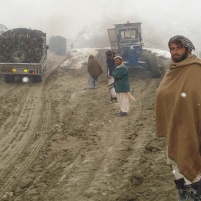U.S. Pays $176 Million to Build Road in Afghanistan
Tuesday, May 03, 2011
 Gardez-Khost Road
Gardez-Khost Road
The United States is on track to spend nearly $3 million a mile on a new highway in southern Afghanistan, making it a monument to corruption and ineptitude.
The Gardez-Khost Road was conceived to link the Afghan government to remote areas of the country south of Kabul near the border with Pakistan. So far, the still unfinished 64-mile road has cost $121 million to build. The final expenditure will probably be closer to $176 million.
At least $1 million was paid to a shady figure known as Arafat, who promised protection to the subcontractors working on the project. Arafat reportedly has connections to the insurgents battling American soldiers and may have staged attacks himself in order to raise the praise of his security contract.
Since the road project started, there have been 363 insurgent attacks, including 108 roadside bombs, and 19 local workers have been killed.
“The vast expenses and unsavory alliances surrounding the highway have become a parable of the corruption and mismanagement that turns so many well-intended development efforts in Afghanistan into sinkholes for the money of American taxpayers, even nine years into the war,” wrote The New York Times about the effort.
The project has been financed by the United States Agency for International Development (USAID), which gave the contract to the Louis Berger Group of New Jersey and Black & Veatch of Kansas. In November 2010, Louis Berger agreed to pay $69.3 million to settle charges after a whistleblowing auditor, Harold Salomon, exposed several years of overbilling by the consulting and construction services company, which sells itself as specializing in “post-conflict environments, post-disaster environments, and areas of insurgency.”
Among the many problems that arose with the Gardez-Khost Road project was that Louis Berger subcontracted with Indian and South African companies, which in turn subcontracted with Afghans, who found other subcontractors. Because each company took cuts from the original USAID money, by the time financing reached people who were actually performing construction, there was not enough money to do the work.
In addition, part of the area was controlled by the Haqqani Group, which is connected with Pakistan’s Inter-Services Intelligence (ISI) and is considered a terrorist group. The fact that an Indian company was operating in a Pakistan-friendly region did not sit well with locals.
-David Wallechinsky, Noel Brinkerhoff
Costly Afghanistan Road Project Is Marred by Unsavory Alliances (by Alissa Rubin and James Risen, New York Times)
- Top Stories
- Unusual News
- Where is the Money Going?
- Controversies
- U.S. and the World
- Appointments and Resignations
- Latest News
- Trump Goes on Renaming Frenzy
- Trump Deports JD Vance and His Wife
- Trump Offers to Return Alaska to Russia
- Musk and Trump Fire Members of Congress
- Trump Calls for Violent Street Demonstrations Against Himself






Comments